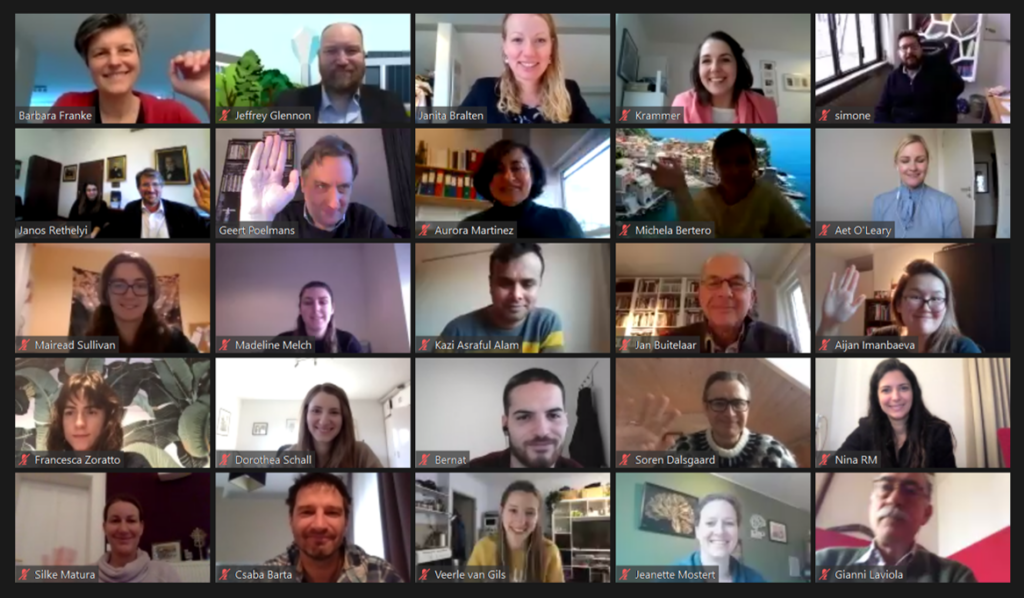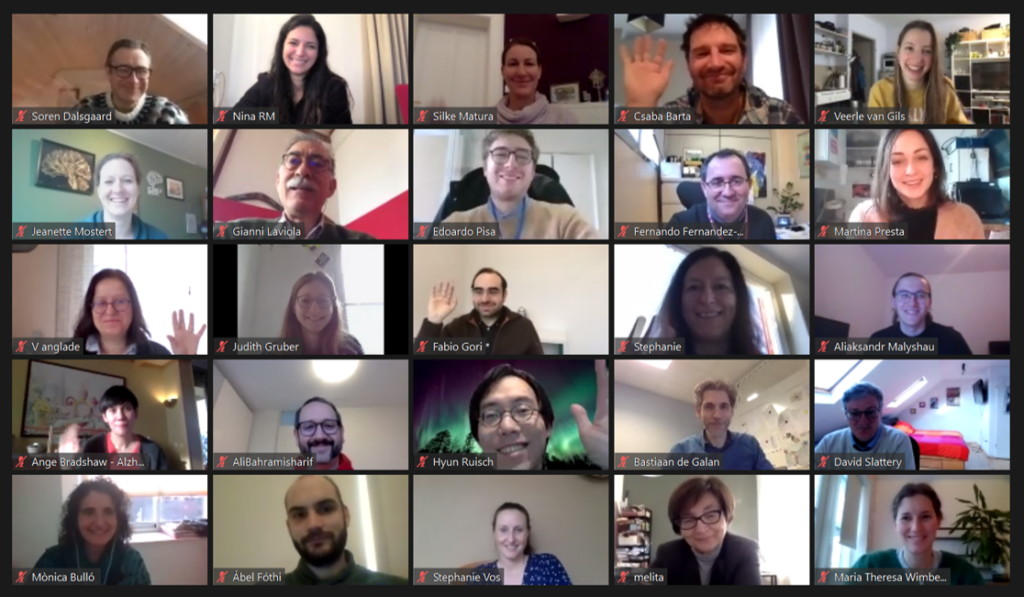-
Home
News & Events
Project News
This section keeps you updated on any major developments throughout the course of the PRIME project
-
Final meeting of the PRIME project held in Cologne
12 December 2024Cologne, December 12, 2024 – The PRIME project, a groundbreaking research initiative focused on advancing our knowledge on the role of insulin signaling in brain disorders, and the overlap (or ‘multimorbidity’) with somatic conditions, is holding its final meeting today and tomorrow in Cologne. This milestone event marks the conclusion of years of dedicated work, as researchers, industry partners, and stakeholders gather to present the project’s outcomes and discuss its far-reaching implications.
During the meeting, participants are showcasing the key results achieved by the project, which have significantly advanced knowledge and applications in this vital research area. From novel methodologies to practical solutions, PRIME has laid a strong foundation for future innovations, with its findings already influencing academic circles and industry practices.
As attendees reflect on the project’s success, a bittersweet atmosphere prevails. Many expressed sadness at the formal end of the initiative, which has fostered remarkable collaborations and breakthroughs. Prof. Barbara Franke, coordinator of the project, noted, “PRIME has not only been a hub of innovation but also a vibrant community of passionate experts. It’s hard to say goodbye to this chapter, but we’re excited about the doors it has opened.”
Despite the project’s conclusion, there is widespread optimism about the continuation of research in this critical field. Efforts are already underway to secure new funding and partnerships to build on PRIME’s legacy. As Prof. Franke emphasized, “The work doesn’t stop here. PRIME has shown us what’s possible, and we are committed to pushing these boundaries even further.”
The two-day meeting will conclude with a discussion of strategies for sustaining momentum in the research field, ensuring that PRIME’s impact will be felt for years to come.
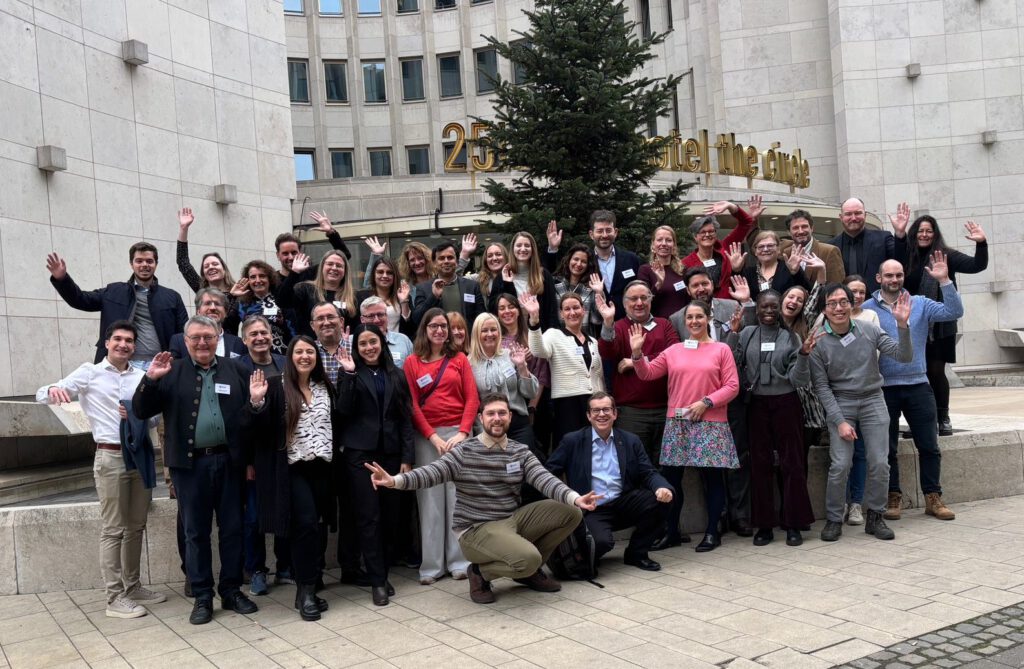
-
Jordi Salas-Salvadó and Fernando Fernandez-Aranda receive annual award from the Royal National Academy of Medicine of Spain
12 December 2024The Royal National Academy of Medicine of Spain (RANME) has awarded its annual awards, which publicly recognize the work, dedication, work and career of medical professionals in Spain and those who are dedicated to giving it visibility. Two researchers from PRIME, Jordi Salas-Salvadó from IISPV and professor of Nutrition at the Rovira i Virgili University, and Fernando Fernandez-Aranda, Professor and Director of Eating Disorders Unit, Department of Clinical Psychology, University Hospital Bellvitge, have received the most important award awarded in these distinctions which, in addition to the recognition, entails the corresponding academic title of the RANME, the medal of the academic body and the accrediting diploma. Congratulations!
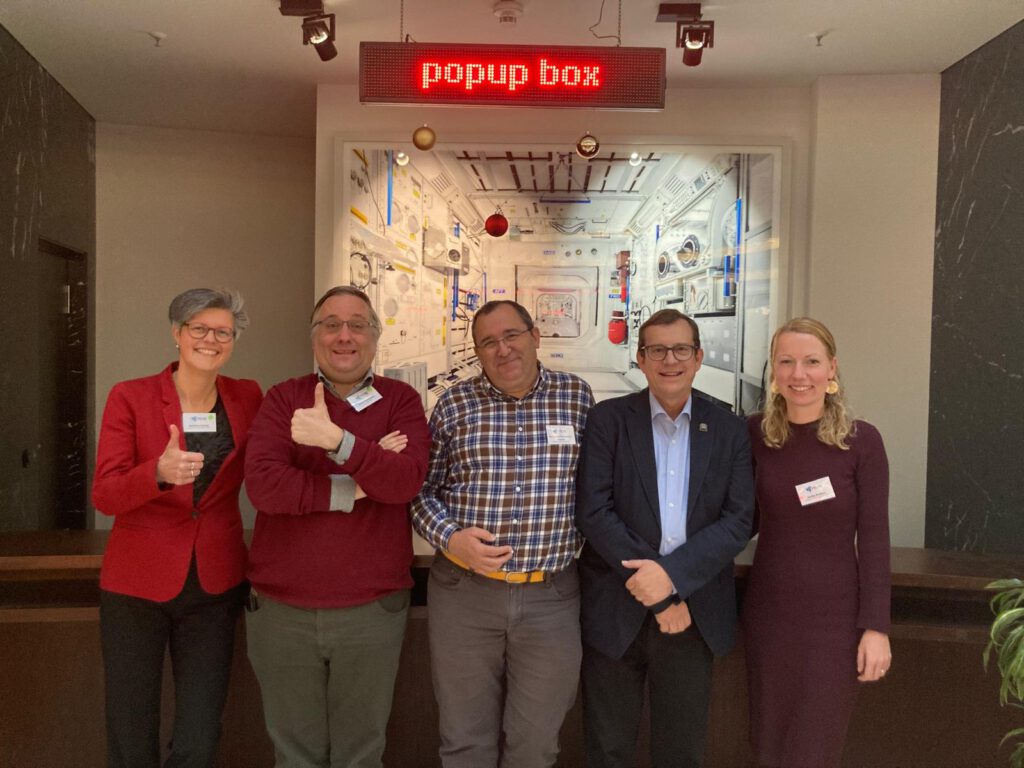
-
PRIME Public Event on Bridging Brain and Somatic Health – Register now to join online
13 November 2024On 13 November 2024, 13:45 – 15:35 PRIME hosts the session A Healthy Brain in a Healthy Body: Bridging Brain and Somatic Health at the Brain Innovation Days. Register here to join the session online. Or attend the Brain Innovation Days to join in person.
The increasing number of people living with two or more chronic disorders (multi-morbidities) poses an urgent need to better understand underlying mechanisms for better prevention and care throughout the life course. Somatic disorders (e.g., type 2 diabetes) and brain disorders (e.g., Alzheimer’s disorder) often co-occur. This session aims to explore the link between mental and non-mental disorders and how to better address it in clinical practice and medical education.
The event is hosted by prof. Barbara Franke (PRIME coordinator) and Marina Koussathana (Project Advisor). In session 1, prof. Andreas Reif and prof. Henrik Larsson discuss the latest EU research bridging brain and somatic disorders. In session 2, representatives of Alzheimer Europe, IDF Europe, and ADHD Europe discuss patient perspectives on the need to integrate brain and body care. Finally in session 3, clinical guideline recommendations will be presented by dr. Alexander Häge, and the need for guidelines and medical education will be discussed with the panel.
More information can be found on https://www.braininnovationdays.eu/programme-day-1/
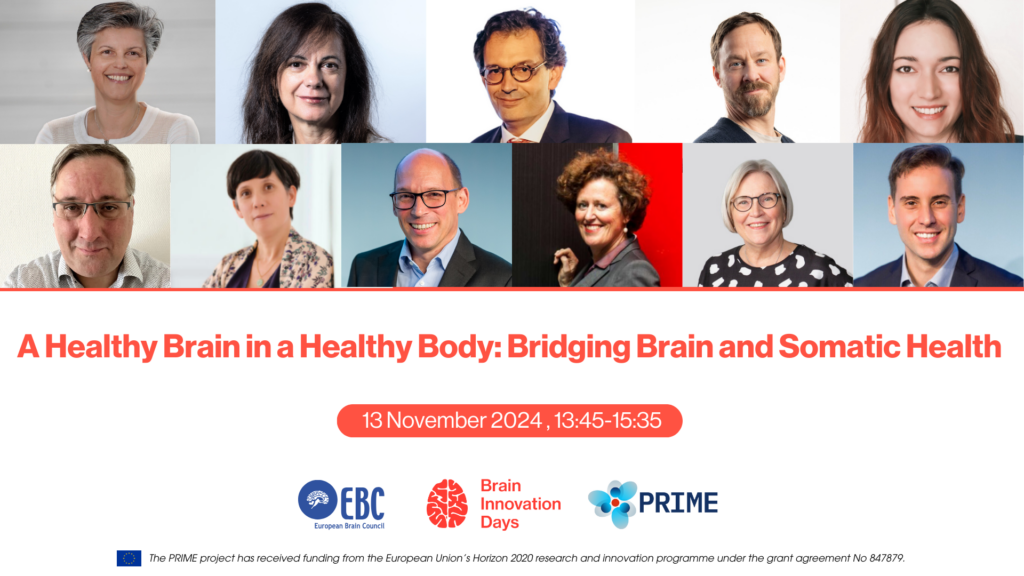
-
Biology of behavioural addictions, interdisciplinary collaboration and patient treatment: experiences of six months secondment in Barcelona
1 November 2024PhD student Angela Ottomana (Istituto Superiore di Sanita, Rome) visited collaborators at IDIBELL in Barcelona, sponsored by the PRIME training program. This is what she learned during her six months secondment.
Thanks to the PRIME consortium, I had the opportunity to complete a six-month internship at the Psychoneurobiology of Eating and Addictive Behaviour research group from the Bellvitge Biomedical Research Institute (IDIBELL), part of the Clinical Psychology Department in the University Hospital of Bellvitge, located in Barcelona. During my internship, I was hosted by Prof. Fernando Fernandez-Aranda, Prof. Susana Jimenez-Murcia, and the team of the Eating Disorders and Behavioral Addictions Units. This group specializes in the treatment of eating and gambling disorders, focusing on conditions such as binge eating disorder, anorexia nervosa, and gambling disorders. One of the key tasks I worked on was a cluster analysis that examined the role of the endocannabinoid system in influencing these disorders. Specifically, I analysed how the levels of two particular endocannabinoids varied in relation to the disorder type, age, gender, and certain executive function parameters, including impulsivity, attention skills, and emotional state. This experience allowed me to gain hands-on experience in advanced data analysis techniques and deepen my understanding of the biological underpinnings of behavioural addictions.
In addition to the technical skills acquired, this internship allowed me to relate with other interdisciplinary researches and to understand the importance of collaboration. I actively participated in clinical sessions presented by both clinicians and researchers from the group and I attended an international seminar on the topic of eating disorders, held in a beautiful, historically university building. The seminar and clinical sessions brought together experts from various disciplines – ranging from psychology, medicine, to nutrition – providing a platform for researchers and clinicians to exchange insights.
Another significant aspect of the experience was the approach to patient treatment. Patients were not only provided with medical and nutritional care to address their physical health but also received comprehensive psychological support. This integrative approach allowed me to first-hand realize how strongly physical and mental health are interconnected.
Finally, exploring a new city like Barcelona was an added advantage of this experience. Living in such a vibrant, culturally rich city provided both personal and professional growth and allowed me to step out of my comfort zone, fostering independence and resilience. This experience provided me with valuable technical skills and personal enrichment, and it reinforced the importance of addressing both physical and mental aspects of health in complex disorders – as PRIME project emphasizes.


-
Learning new iPSC measuring techniques in Budapest
25 July 2024PhD student Dorothea Schall from Heidelberg visited her collaborators in Budapest for a 2-month secondment, supported by the PRIME project
Due to the PRIME project I had the opportunity to visit our collaboration lab in Budapest beginning of this year. We are both working in the same work package within PRIME, both working with iPSC-derived neurons. The group of János Réthelyi, together with Ágota Apáti and Katalin Vincze, is working with diabetic patient lines to investigate how these neurons behave during early neuronal development compared to a healthy control. During my stay in Budapest I was able to learn two techniques: calcium imaging and MEA measurements. Especially MEA measurement was very interesting for me, because you can basically watch the cells live communicating with each other. Moreover, we could clearly see how the neurons mature over time and communicate more and more the older they got. It was every time a lot of fun to measure the cells and see their behaviour!
Fortunately, I did not only have a great time experimental wise, but also with the people. All lab members were extremely nice to me, I was integrated very fast and had a great time! I’m very happy I was able to get to know all these people. Last but not least I fell in love with Budapest, one of the most beautiful and versatile cities I have visited so far. I can warmly recommend a visit!

-
Brain Talks Podcast with PRIME: The Integration of Mental and Somatic Health
24 June 2024The increasing number of people living with two or more chronic disorders (multimorbidities) poses an urgent need to better understand underlying mechanisms for better prevention and care throughout the life course. Somatic disorders e.g., type 2 diabetes and brain disorders e.g., Alzheimer’s disorder often co-occur. If a single molecule was the key to some of the greatest health challenges of our time, what would tomorrow look like?
Don’t miss this special episode, where Sam Pauly sat down with PRIME researchers Silke Matura and Simone Macri!
Click here to listen to the full episode!
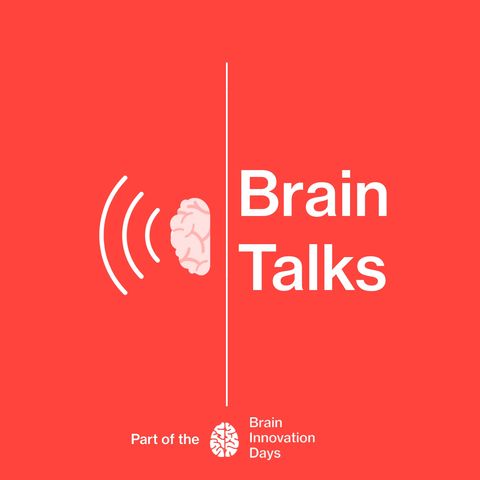
-
Spanish PhD student Carlos Gomez visited partners in Maastricht for shared data analysis
7 June 2024PhD student Carlos Gomez from FUNDACIO INSTITUT D’INVESTIGACIO SANITARIA PERE VIRGILI (IISPV), Reus, Spain, spent two weeks this summer at the lab of PRIME partners in Maastricht. In this blog he shares his experiences.
Thanks to the PRIME project, I had the opportunity to go to the Department of Psychiatry & Neuropsychology, Alzheimer Center Limburg, School for Mental Health and Neuroscience at Maastricht University in the Netherlands. I was hosted by Willemijn Jansen, Stephanie Vos and Veerle van Gils. They gave me a warm welcome. It was a great experience. Working with this institution gave me the opportunity to participate in a PRIME project that involves the study of type 2 diabetes and inflammation biomarkers with cognitive decline. During the two weeks of my stay, I worked on data analyses using the Maastricht study database and I had time to do the first results draft document. It was exciting to do a lot of analysis in only 2 weeks. All the interactions I had with my supervisors as well as all the teammates working at the host institution were really helpful. Thanks to this, my personal and professional experience was fruitful. Furthermore, I had great experiences in the social life in Maastricht, going to karaoke and bowling with the Maastricht teammates. Now, we are in talk with the Maastricht group to have more accurate and final results, and we will do our best to do a research manuscript before this 2024!

-
5th PRIME General Assembly Meeting
15 May 2024On 13-15 May 2024, the PRIME consortium reconvened for the 5th General Assembly (GA) meeting in the beautiful city of Bologna (Italy). During the GA meeting, the latest research findings were discussed, and early career scientists were given opportunities to present their projects. The participants also enjoyed exploring the charms of Bologna. Additionally, an insightful keynote lecture was provided by Prof. Leszek Czupryniak on GLP-1 drugs, such as Ozempic. He elaborated on how these innovative drugs might enhance cognition and brain function in Alzheimer’s disease, though further research is needed in this area. The consortium was also delighted to listen to talks from its project partners Alzheimer Europe, IDF Europe, and ADHD Europe about how to improve communication between researchers and individuals with lived experience. As always, communication is key!
It was wonderful for the members to reconnect and discuss the latest research results on insulin and brain disorders, in person. The time in Bologna was indeed inspiring and enriching. As the consortium enters the final seven months of the project, it is committed to diligently compiling collected data and connecting the dots.
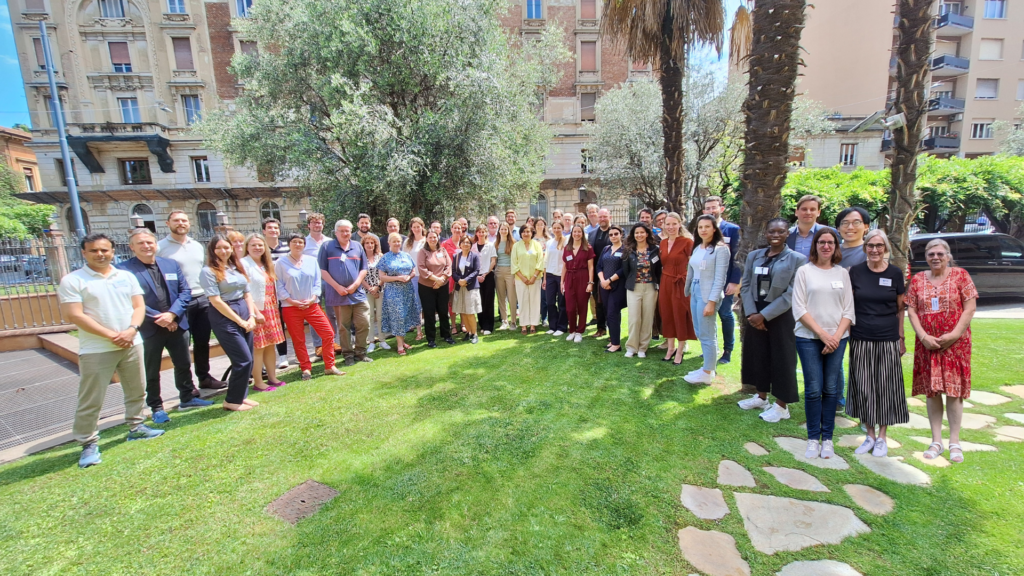
-
8ᵗʰ PRIME Steering Committee meeting
11 December 2023On Monday, 11ᵗʰ December 2023, the 8ᵗʰ PRIME Steering Committee meeting took place. Heading towards the final year of the PRIME project, we had great discussions about our project’s findings on insulin and brain disorders, as well as about our next steps for both research and dissemination.
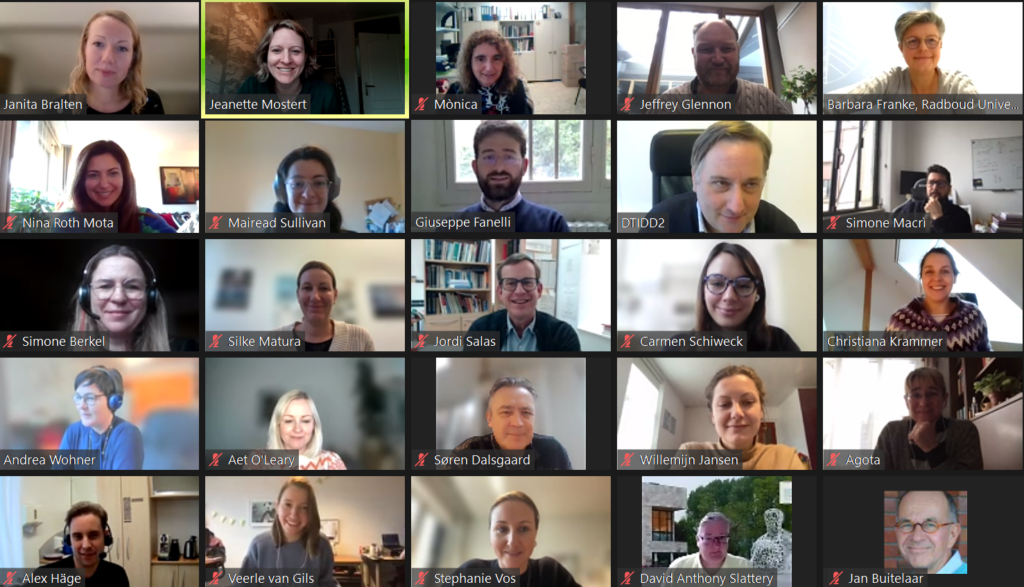
-
Experiences of a summer secondment in Heidelberg
18 September 2023
View over Heidelberg 
Sunset seen from the 5th floor of the Human Genetics Institute PhD student Katalin Vince from Semmelweis University, Budapest, spent two months this summer at the lab of PRIME partner dr. Simone Berkel in Heidelberg. In this blog she shares her experiences.
This year, I had the opportunity to visit the Department of Human Genetics at the University of Heidelberg. We’ve been working in collaboration with Simone Berkel and her team for several years in the framework of the PRIME project. Now, we finally had the opportunity to work together in person. I spent two months in Heidelberg, during which time I got to know new methods, and we had the chance to share our daily experiences and small technical skills that we would not have been able to do online. It became clear to me that it is a fundamental priority at the institute to always have the time and space to discuss both scientific and technical questions that arise. This was useful both for my personal professional development and for the project.
The work was fascinating from the first day when I started working with KCNQ1 heterozygous KO iPSCs. On the one hand, I generated neuronal progenitors using a method I had used before. The resulting cell lines can be used for functional studies and later differentiated in a neuronal direction. At the same time, I had the opportunity to work with another differentiation method using small molecules; this protocol made it possible to generate postmitotic neurons in 16 days. During this part of my work, I also performed a series of functional measurements to monitor neurite outgrowth using the Incucyte system. I was very fortunate because I had the opportunity to join the institute meetings, where not only did the individual students present their progress, but there was also time and space to discuss questions that arose during the work. These discussions were always very inspiring and valuable. Lab life was well organized, people from different disciplines knew each other well, and communication between team members and groups was excellent. The atmosphere was amicable and welcoming, with many foreign exchange students. Last but not least, it was a wonderful experience to be in Heidelberg, a city not only famous as a European research center but also worth a visit for its historical monuments.
-
Two podcast episodes on insulin, diet and mental health
25 January 2023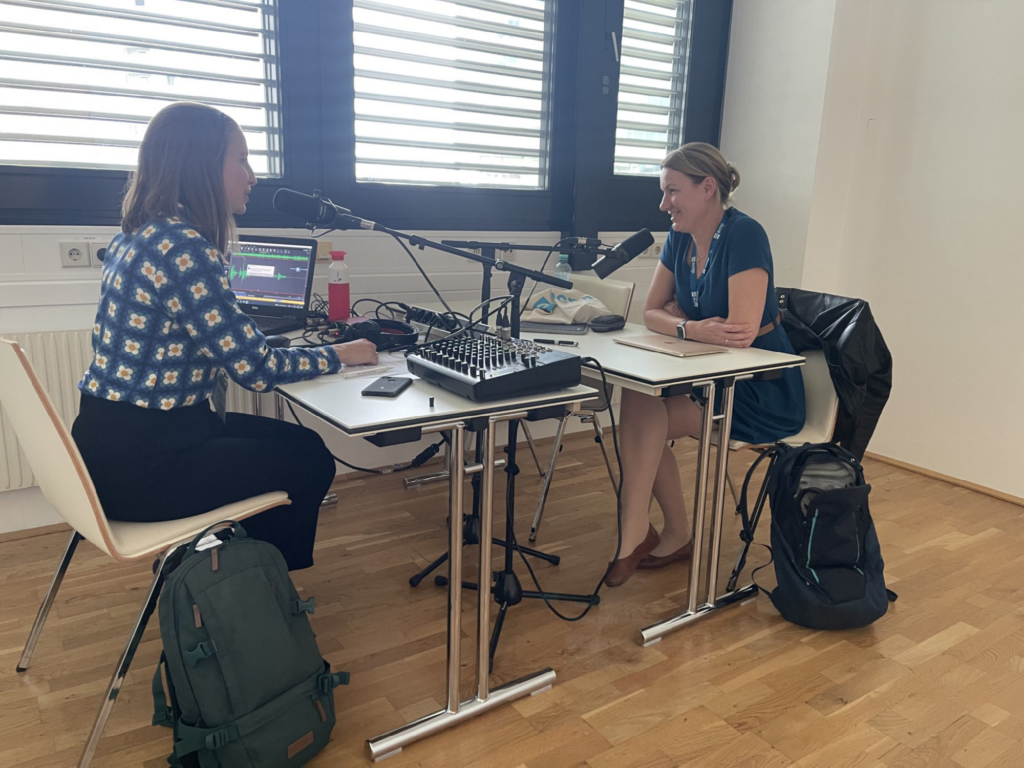
PRIME partners dr. Silke Matura (Goethe University Frankfurt) and Veerle van Gils (Maastricht University) have recorded two podcast episodes as part of the ECNP podcast series. In these two episodes they talk about their research as part of the PRIME study. In part 1 they discuss the role of dysfunctional insulin signaling as modulator of mental and non-mental chronic diseases. In part 2 they go further into the effects of lifestyle on cognition, and the various techniques used to measure different types of cognition. You can listen to the podcast on Spotify, iTunes, Buzzsprout, or here: Part one, Part two
-
What Genetics Can Teach Us About Mental Health
5 October 2022Master student Barbara Šakić has written a blog about why genetic research on psychiatric illness is important. For this purpose she has interviewed PRIME coordinator Dr. Janita Bralten. You can read the blog here.
Click for more -
Interview with Dr. Janita Bralten on ‘Insulinopathies of the brain? Genetic overlap between somatic insulin-related and neuropsychiatric disorders’
12 July 2022As part of the ‘Research in Practice in Mental Health’ series, Dr. Janita Bralten recently gave an interview talking about PRIME’s work on the genetic overlap between somatic disorders and brain-based disorders. To hear the full interview, please click here.
-
Jordi Salas-Salvadó receives the International Award for Excellence in Research from the International Nut & Dried Fruit Council
17 May 2022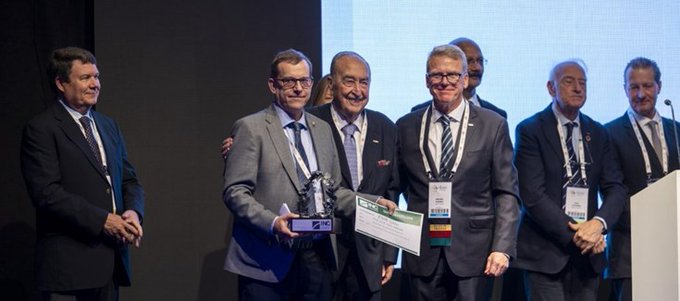
The CIBEROBN group leader and Distinguished Professor of Nutrition at the University Rovira y Virgili (IISPV) Jordi Salas-Salvadó has received the Award for Excellence in Research during the XXXIX World Nut and Dried Fruit Congress, which was held in Dubai on May 11-13, 2022. This award recognizes the scientific research career of excellence in the field of Nutrition and specifically in the study of the beneficial effects of nuts and dried fruits on health. Professor Salas-Salvadó has been investigating the effect of nuts on body weight and different markers of cardiovascular risk for about two decades using animal models, epidemiological studies and clinical trials. He has published more than 20 articles in the field of nut studies and has also been one of the leaders and promoters of the PREDIMED study, a multicenter clinical trial with more than 7000 participants recognized worldwide that has contributed to clarify the importance of the Mediterranean diet enriched with nuts or olive oil on the prevention of diabetes, metabolic syndrome or cardiovascular disease. Now is leading the PREDIMED-plus study, another large clinical trial (>6000 participants followed by 8 years) aiming to assess the effect of lifestyle intervention on the primary prevention of cardiovascular disease where cognition, depression and impulsivity are well characterized. Prof Salas-Salvadó has written more than 800 scientific articles in Science Citation Index and has been declared as a “highly cited researcher” between 2018 and 2021 by Clarivate. He is participating in different National, European (Eat2BeNice, PRIME, STOP), USA (NIH) and Canada (CIHR) projects.
-
PRIME study – what research on mice can tell us about insulin and mental disorders
3 May 2022Professor Simone Macri works at the Istituto Superiore di Sanita in Rome, Italy. In this video, he and two of his group members, Martina Presta and Angela Ottomana, tell you about the research that they are doing as part of the PRIME study.
This video has been created as part of a multimedia installation at the Istituto Superiore di Sanita and can also be viewed there at the main entrance (Viale Regina Elena 229, 00161 in Rome, Italy).
-
New publication “Insulinopathies of the brain? Genetic overlap between somatic insulin-related and neuropsychiatric disorders”
14 February 2022In PRIME, we hypothesized that there might be shared underlying biological mechanisms between insulin-related somatic disorders and brain-based disorders. In this manuscript, coming out of the genetics work package of PRIME, we indeed show that there is a significant genetic overlap between somatic insulin-related disorders and brain-based disorders. This work is a proof-of-principle that we are on the right track in PRIME, where we will now continue to investigate which genetic variants play a role in this genetic overlap.
Read the full publication here.
To explore more PRIME publications, click here.
-
COGNOMICS workshop “Capturing the brain for neuroimaging genomics”
5 May 2021What is Cognomics? The Cognomics Initiative includes several excellent research groups from Nijmegen who have joined forces to unravel the complex connections between genes, brain structure and function, and cognitive processes such as memory, language and those relevant for psychiatric disorders. Their conferences aim to foster knowledge exchange and collaboration in the broader field of brain imaging genetics.
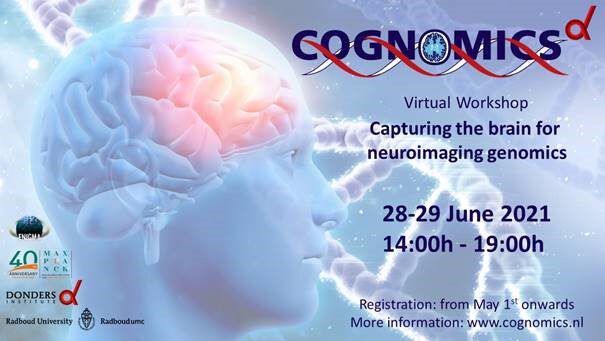
Like our past in-person conferences, the workshop will include keynote lectures, as well as smaller-scale breakout sessions in which junior researchers will get the opportunity to present their work in the presence of their peers and research leaders, providing time for discussion of each of the contributions. Leading experts will discuss innovations in characterizing the human brain for imaging genomics research and beyond, with keynote lectures on environmental effects (Lauren Salminen), genome screens of EEG traits (Dirk Smit) and functional MRI (Henrik Walter), and transcriptomics of oscillatory activity (Genevieve Konopka).
Please mark your calendars now!
If you would like to present your work during one of the breakout sessions, please send an email to cognomics@radboudumc.nl.
More information about registration will become available soon.
-
Watch how brain cells form networks in the laboratory
12 March 2021One method to study the brain is by growing brain cells in petri dishes. This way we can investigate the function of specific proteins in these brain cells, which can tell us more about how the brain works.
Doctoral student Dorothea Schall from Heidelberg has made a video of the brain cells that she is growing for her research. She uses cells that are created from human skin cells (fibroblasts) and reprogrammed these so that they behave like stem cells. These cells are called induced pluripotent stem cells, or iPSCs in short. Those iPSCs then differentiate into neuronal stem cells, after which they further develop into a type of brain cells called cortical forebrain neurons. During the video you see that the cells start to grow branches, the so-called neurites, to create connections between the different cells and cell clusters. They start with rather big neurites to first find each other, and then continue to strengthen and refine the network by producing a lot of small neurites. At the end of the video (after 11 days) you can see that very highly connected cells merge into a single cell. This interconnected network of neuronal cells can be seen as a (very primitive) mini-brain.
Dorothea Schall says: “Those neurons are important for my work, because I can use them to investigate the function of a specific protein (called KCNQ1) in these cells. To do so, I will create cells with an inoperative gene, encoding the protein of interest, leading to non-functional protein or no protein at all. By comparing those cells missing the function of the protein of interest and ‘normal’ cells, I’m able to examine the function of this protein in neurons, which is unknown so far.”
-
Upcoming PRIME Webinars!
11 March 2021* Tuesday 30 March at 16:00h (CEST): Neurodevelopmental Disorders (ASD, ADHD and OCD) – by prof. Jan Buitelaar
Autism Spectrum Disorder (ASD) and Attention-Deficit Hyperactivity Disorder (ADHD) are neurodevelopmental disorders with onset in early childhood by definition (ASD) or in most cases (ADHD). ASD is characterized by persistent problems in social interaction and communication and rigid patterns of behaviour, and ADHD by a pattern of inattentive and/or hyperactive-impulsive behaviours. ASD and ADHD have a strong phenotypic overlap and share genetic risk factors and neural underpinnings. They are thought to be due to early disruptions of brain development, at the prenatal or early post-natal stage. Obsessive-compulsive Disorder (OCD) is classified among the anxiety disorders, and characterized by a pattern of recurring thoughts (called “obsessions”) and/or behaviors that need to be repeated (called “compulsions”) to an extent which generates distress or impairs general functioning. OCD mostly has onset around age 10 or later. This webinar will review the clinical characteristics, onset and course of these disorders, identify similarities and differences.
*Monday 17 May at 10:00h (CEST): Retinal and cognitive dysfunction in type 2 diabetes: unravelling the common pathways and identification of patients at risk of dementia – RECOGNISED – by prof. Noemi Lois
RECOGNISED aims at determining the usefulness of the retina as a tool to identify people with type 2 diabetes and cognitive impairment, and those at risk of developing cognitive decline and dementia.
-
Highlights from the first PRIME General Assembly meeting
15 January 2021By Jeanette Mostert – Dissemination Manager
One of the perks of being part of a European research consortium is that once a year you get to travel to a nice location, meet your fellow consortium members and engage in scientific and non-scientific discussions over breakfast, lunch and dinner. Unfortunately, such an in-person event was not possible this year. And hence, the first general assembly meeting of the PRIME project was organised on Zoom, from the comforts (and discomforts) of our own homes. But despite being physically distanced, the meeting was still a great success. More than 50 partners joined from 9 countries for 2.5 days of scientific discussions.
I will share some personal highlights.
1. Early career scientists are already producing the first results
The meeting started with a masterclass for early career scientists. These are the master students, PhD students and post doctoral researchers that are spending most of their time collecting data, working in the lab, doing analyses and generating results. They presented their research plans and first results, and received feedback from senior members of the scientific advisory board. For instance, PhD student Giuseppe Fanelli has analysed the genetic overlap between metabolic conditions (obesity, type 2 diabetes, metabolic syndrome) and neurological/mental conditions (Alzheimer’s disease, autism disorder, obsessive compulsive disorder). These results will soon be published in an academic journal. Others are working hard on growing cells in petri dishes, training mice to do memory tests and recruiting participants for clinical studies.
2. Inspiring inter-disciplinary collaborations
Doing science “from molecule to man” is a bit of a buzz-word in the field. Nevertheless, this consortium really does encompass all steps, ranging from studies in single neurons to population studies that include data of 1.9 million individuals. I find it inspiring to be part of discussions where results from animal research are compared to clinical findings in humans, and where genetic findings are interpreted in the context of population data. Such close collaboration helps us to answer questions such as:
- How are neurological/mental disorders and metabolic/somatic disorders linked?
- What is the role of insulin in the link between neurological and metabolic disorders?
- What is the role of the molecule KCNQ1 in the link between insulin and metabolic, neurological and mental disorders?
- Can we identify new drug targets to improve disease outcomes or prevent disorders in susceptible individuals?
3. Don’t forget to exercise and enjoy nature!
We know that sitting all day indoors is not good for you. So the project management and project leaders encouraged us in various ways to take effective breaks. This included a joint 2-minute work out, which was great fun. We were also provided with virtual walks through nature, taken in the surrounding of Nijmegen (the city in The Netherlands were we had planned to organize the meeting) and through the snowy forests of Germany. Thanks to these active breaks, my brain was able to keep up with all the new information that was coming in.
Next year we hope to see each other in person again, and share new results and insights. Until then, we will keep sharing the latest news on this website and on our social media. Be sure to follow us so you won’t miss out on the next steps of our consortium!
-
Two young PRIME scientists awarded with prestigious grant in The Netherlands
5 November 2020Dr. Janita Bralten from Radboudumc and Dr. Willemijn Jansen from Maastricht University have each obtained a prestigious research grant from the Dutch Research Council. This VENI-grant awards researchers who recently obtained their PhD with 250,000 euro’s to further develop their research ideas for a period of three years.
Dr. Janita Bralten aims to gain a better understanding of psychiatric disorders based on genetic traits. She will do this by investigating genetic subgroups in the total population that are related to psychiatric problems, going beyond psychiatric diagnoses. Dr. Willemijn Jansen will investigate why some people are resilient to developing Alzheimer’s symptoms, even though their brains do show markers of pathology. For this she will study proteins in cerebrospinal fluid (the fluid that’s present in the brain and spinal cord). Through this research she hopes to find clues that help to develop new treatments for Alzheimer’s Disease.
You can read more about the VENI-grants here: https://www.nwo.nl/en/calls/nwo-talent-programme
-
PRIME researchers on the implications of the COVID-19 pandemic for eating disorders
8 May 2020Lead by Prof. Fernando Fernandez-Aranda from the University of Barcelona, they describe the challenges faced by both patients and health care workers and provide possible solutions to improve care in these times (and even beyond the crisis). “[The COVID-19 pandemic] highlights the core need for connection and the pain of loneliness which are often central but sometimes forgotten symptoms of people with pre-existing mental health”. Read it here.
-
PRIME – EU funded research project on insulin multimorbidities kicks off!
15 January 202017 European institutions from 9 countries come together to study the mechanisms underlying mental and somatic insulin multimorbidity across the lifespan.
